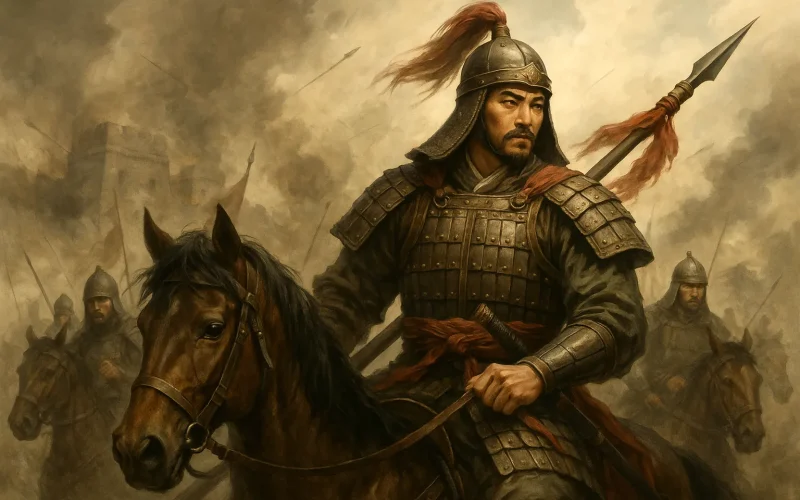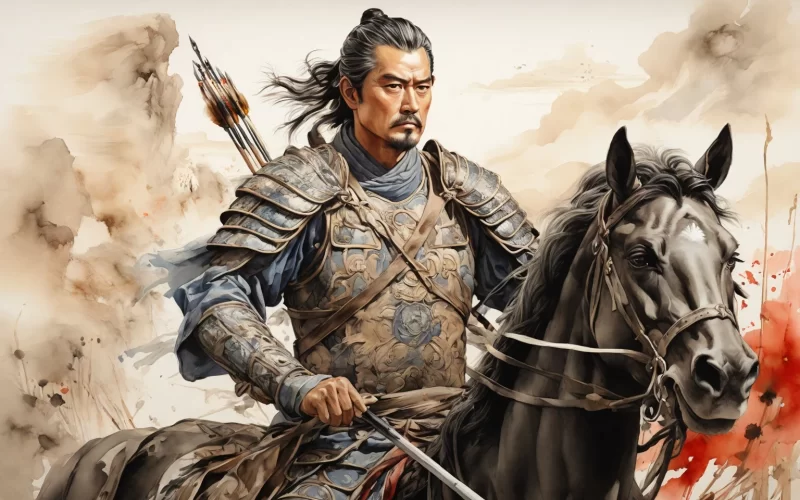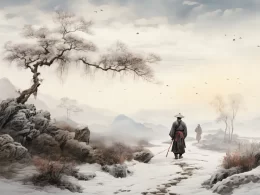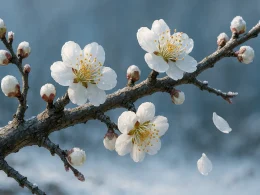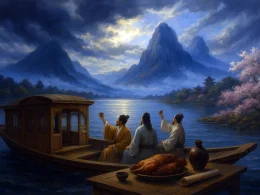After a hundred battles, his armor is worn,
The southern town surrounded ring on ring in the morn.
When he breaks through and kills the chief of Tartar peers,
He comes back with a thousand beaten cavaliers.
Original Poem:
「从军行 · 其二」
李白
百战沙场碎铁衣,城南已合数重围。
突营射杀呼延将,独领残兵千骑归。
Interpretation:
This poem, written during the High Tang period, reflects an era of national strength and frequent border conflicts, where soldiers fought bravely in battle. Through vivid imagery, Li Bai portrays the Tang army’s courageous breakthrough amidst dire circumstances. The poet not only celebrates the soldiers' heroic spirit in defending their nation but also conveys his own aspirations to serve the country and achieve greatness.
First Couplet:“百战沙场碎铁衣,城南已合数重围。”
(Having endured countless battles, the soldiers’ armor is shattered, and the southern city is surrounded by multiple enemy lines.)
This couplet uses phrases like "a hundred battles on the battlefield" and "shattered armor" to depict the frequency and intensity of the conflict, highlighting the harsh and brutal nature of war. The detail of "shattered armor" suggests extreme exhaustion, long-term combat, and inadequate supplies, creating a vivid atmosphere of desperation. Meanwhile, "the southern city encircled by layers of enemy troops" intensifies the sense of crisis, portraying the Tang army on the verge of collapse. Such descriptions immerse the reader in the soldiers’ dire situation and the grim reality of war.
Second Couplet:“突营射杀呼延将,独领残兵千骑归。”
(In a daring breakout, they shot and killed General Hu Yan, leading the surviving thousand cavalrymen to safety.)
This couplet captures the heroic and decisive actions of the commanding general. Rather than directly describing the chaos of battle, Li Bai focuses on the critical moment of "shooting and killing General Hu Yan," underscoring the leader’s intelligence and courage in changing the tide of the battle. The phrase "leading the remaining thousand cavalry" conveys the resilience and determination of the general, who, despite overwhelming odds, successfully leads his troops to safety. This scene epitomizes an indomitable spirit and extraordinary leadership under pressure.
Writing Features:
- Concise and Powerful Language: Li Bai employs succinct yet vivid language, using detailed imagery to create an intense battlefield atmosphere. Despite its brevity, the poem conveys the ferocity of the conflict and the heroism of the protagonist.
- Atmosphere and Imagery: The descriptions of "shattered armor" and "multiple encirclements" establish a perilous and hostile environment, setting the stage for the hero’s eventual triumph.
- Reversal and Heroism: The poem juxtaposes the soldiers’ dire circumstances with the leader’s heroic breakthrough, creating a sense of hope and triumph against the odds. This shift leaves a lasting impression of perseverance and victory.
Overall Appreciation:
This poem recounts the story of the Tang army’s successful breakthrough under the command of a courageous general during a desperate situation. Through concise language and vivid battlefield imagery, Li Bai highlights both the brutal realities of war and the soldiers’ unyielding spirit. Despite the dire circumstances, the general’s decisive actions and bravery transform the narrative into one of triumph and resilience. The poem celebrates the heroism and tenacity that turn adversity into victory, making it a stirring tribute to the soldiers’ valor.
Insights:
This poem reminds us that even in the face of overwhelming adversity, courage and wisdom can lead to extraordinary outcomes. It teaches us not to lose hope when confronted with challenges, as bold action and determination can often lead to unexpected victories. Li Bai’s work not only honors the heroes of his time but also serves as a timeless inspiration for those who strive to overcome obstacles with unwavering resolve.
Poem translator:
Xu Yuan-chong(许渊冲)
About the poet

Li Bai (李白), 701 - 762 A.D., whose ancestral home was in Gansu, was preceded by Li Guang, a general of the Han Dynasty. Tang poetry is one of the brightest constellations in the history of Chinese literature, and one of the brightest stars is Li Bai.






